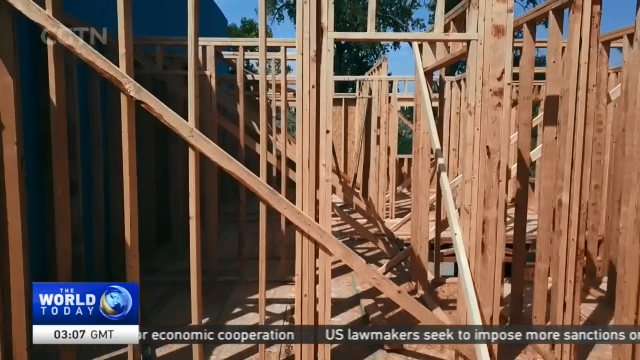
11:22, 22-Aug-2018
US Trade Tensions: Tariffs on Canadian lumber driving up housing prices
Updated
10:40, 25-Aug-2018
02:54

Early warning signs may be indicating trouble on the horizon for the US housing market. New housing and existing home sales have leveled off in recent months, mortgage rates are on their way up. And homes have become more expensive. But US tariffs on Canadian lumber have only added to the cost. CGTN's Hendrik Sybrandy reports from the state of Colorado.
As with other commodities, the price of lumber tends to fluctuate. But over the past year and a half, lumber costs have trended in one direction: Up.
DAVE HOGLUND VP OF PURCHASING BUILDERS "They went up 21%, then another 21, then another 21, and we went on a record run of price increases in the lumber side of things."
Dave Hoglund with Builders, which provides building materials to contractors, says combine that with a lack of available land for new homes in places like Colorado, and a shortage of construction labor.
DAVE HOGLUND VP OF PURCHASING BUILDERS "All three of those coupled together have dramatically increased the cost of housing."
JASON BROWN, PRESIDENT ASCENT BUILDERS "We're generally seeing that it's affecting our overall cost of a home somewhere in the five percent range."
Jason Brown, the head of Ascent Builders, says a 20-percent U.S. tariff on Canadian softwood lumber, imposed last year, triggered the price spike. Western Canadian lumber now costs nearly 80 percent more than it did a year ago.
JASON BROWN, PRESIDENT ASCENT BUILDERS "We're in sort of uncharted territory. If you look at the absolute rates we're all paying for lumber, we've never seen it this high."
HENDRIK SYBRANDY DENVER "The tariff was the answer to a glut of cheap Canadian lumber exports to the U.S. earlier this decade. It was meant to boost domestic lumber producers. Sure enough, Canadian imports have slowed down."
Tree disease, rail slowdowns, and Canadian fires have played a role, too.
DAVE HOGLUND VP OF PURCHASING BUILDERS "When the Canadian lumber went up, all the domestic lumber went with it. So everybody just rode the wave."
One expert says that wave has crashed on small builders in particular.
ERIC HOLT UNIV. OF DENVER DANIELS COLLEGE OF BUSINESS "It's going to affect the guys that are going to Home Depot to buy lumber or plywood or anything like that that is hit by that tariff. So now maybe they slow down their spending on their home remodel projects."
Bigger lumber companies and builders buy their supplies well in advance but once contracts are written, they can't always pass along price increases to their customers.
DAVE HOGLUND VP OF PURCHASING BUILDERS "Margins, that's what makes the world go round, is having those gross margin dollars, and lack of them has been a problem the last 18 months."
The U.S. homebuilders' trade group claims the tariff has added $9,000 to the cost of an average single-family home.
RANDY NOEL, CHAIRMAN NATIONAL ASSOCIATION OF HOME BUILDERS "The lumber tariff is a tax on homeowners and renters. It's time to get back to the negotiating table and reach a trade agreement with Canada."
Brown thinks the tariff tends to get buried as an issue when homes keep appreciating in hot markets like Denver.
JASON BROWN, PRESIDENT ASCENT BUILDERS "Politically I agree with it. Being in the home building industry, I don't like it."
He suspects buyers will sit up and take notice if or when those prices level off. Hendrik Sybrandy, CGTN, Denver.

SITEMAP
Copyright © 2018 CGTN. Beijing ICP prepared NO.16065310-3
Copyright © 2018 CGTN. Beijing ICP prepared NO.16065310-3